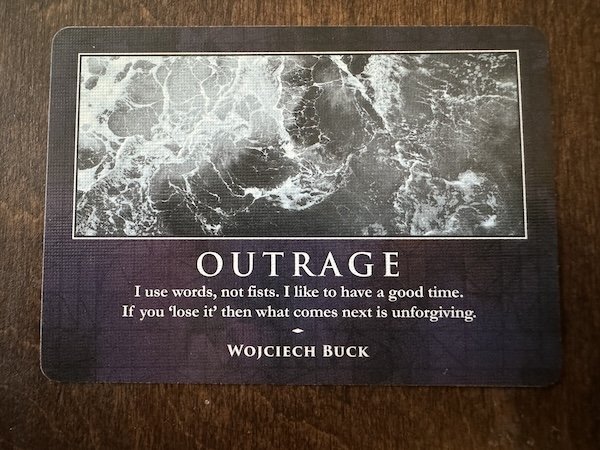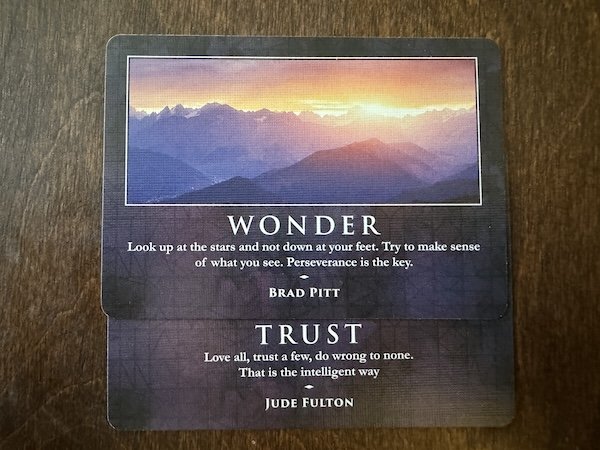A Taxonomy of the Least Plausible Cards in the Evoke Deck
/In my most recent newsletter, I wrote a love letter to the Evoke deck which is something I’ve been having a lot of fun with the past month. But I mentioned a significant issue that I don’t believe was addressed in the instructions. In that newsletter I wrote…
On the download, the cards are praised for how great they look. But I don’t think a single person mentions the fact that the actual content—the text that’s on the cards—is fucking ridiculous. They are completely unrealistic as “motivational posters.” They read like they were written by a drunk AI, or someone for whom English is a 3rd or 4th language. This is not a shot at Craig. It probably would have been impossible for him to accomplish what he was trying to do with the cards and have them read like legitimate quotes.
As I also said in that issue, I actually don’t mind that the cards read so bizarrely.
I’m not the sort of person who would own a deck of “motivational poster” cards.
I am the sort of person who might say, “Look at this stupid deck my friend found at the dollar store. I hope you’re ready to be ‘motivated.’”
The fact that the content of the cards is so dumb, actually provides a reason for me to have such a deck. I don’t think it makes the deck more suspicious. I think it makes it less suspicious.
As long as you acknowledge it, of course. You need to have a backstory for the deck. How you got it and why you kept it. You could say your 96-year-old great aunt got it for you for Christmas. “Apparently she thinks I need to get my life together. She’ll call me every other week and ask, ‘Are you reading the cards, sweetie?’ I don’t have the heart to tell her the cards are some cheap Chinese knock-off of motivational cards and barely make any sense. So I’m just like, ‘Yes, Auntie, they’re making a big difference.’”
I go into the details of the backstory I use in the previously mentioned newsletter.
You may be able to pass these off as legitimate motivational cards in a professional situation where people aren’t really paying much attention to them. But if you introduce this deck to friends in a casual performing environment, and they read a few with their brain even partially turned on, they’re going to be like, “What the fuck is this nonsense?”
So you need to pre-empt that by pointing out that you know they’re goofy. But you thought they were funny. And you had an idea for something you wanted to try using them. Blah, blah, etc., etc.
Okay, that being said, I’m a fan of the deck and have been using it quite a bit. And here are the types of cards my friends have found to be the most questionable/most ridiculous/least plausible as they’ve looked through the deck.
Ones with subjects which would never be on motivational posters.
Ones with subjects which would really never fucking be on motivational posters.
Ones where the quotes given have jack-shit to do with the subject of the card.
Ones with weird grammar that have had the word “fellowship” clumsily jammed into them.
I’m trying to imagine a context where those words could have left Matt Damon’s mouth. Maybe the mentally challenged version of him from Team America?
Ones with clusterfuck language like this.
True joy comes from the joy of something? Oookay… but where did that joy come from? And how does what’s after the comma relate to what’s before it?
Re-write: The experience of true joy comes from the zest of a deed well done.
It’s still a bland, nothing statement. But at least it holds together as a sentence.
Ones with questionable premises.
You absolutely can bury a seed. It’s one of the few things you can do with them.
Ones with quotes that sound like something my drunk uncle would say.
Ones with misattributed quotes with nonsense appended to them.
“Look up at the stars and not down at your feet. Try to make sense of what you see.” Is a Stephen Hawking quote. I guess the unrelated notion that, “Perserverance is the key,” is meant to be Brad Pitt’s contribution.
“Love all, trust a few, do wrong to none,” is from Shakespeare’s All’s Well That Ends Well. But I suppose “Jude Felton” deserves credit for noting, “That is the intelligent way!” (Which is something you can add on to any quote you steal, if you want.)
Ones with quotes attributed to celebrities which—if they actually said such things—would cause their management to put them in the Betty Ford Center for alcohol abuse.
“That is the intelligent way!” is, I believe, George Clooney quoting “Jude Felton” quoting Shakespeare.
Ones that are supposed to be about patience, but are really about fury, and for some inexplicable reason, show someone planting flowers.
Ones with quotes that are so stupid, you would not even acknowledge them if your friend said them. Much less remember them, transcribe them, and have them printed on a motivational card.
The real quote is by Tom Robbins from Still Life With Woodpecker. “There are only two mantras. Yum and yuck. Mine is yum.” In the context of the book, and with the word “mantras” instead of “rules,” the quote works.
For methodological reasons, “Mantras” had to be changed to “rules.” And, “You can have Yuck for yourself!” Needed to be added.
The resulting sentence sounds not so much like a motivational poster, but a response to the question: “And what did that violent special needs child scream before shoving his feces into your mouth?”
To reiterate, if you’re table-hopping and no one is ever going to get much of a look at the cards, you might not feel the need to acknowledge that they’re so wonky. But if you plan on showing them to people in a circumstance where they might read them and absorb what they say, you’ll want to pre-emptively mention that you recognize the cards are odd. That is the intelligent way!













